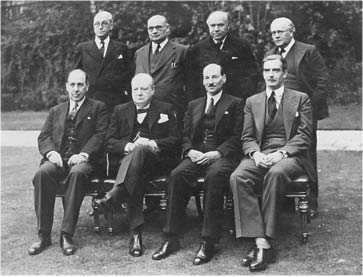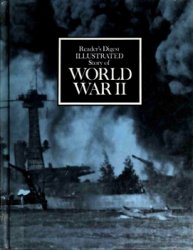
"It is probably easier to form a Cabinet...in the heat of battle.”
The War Cabinet, 16 October 1941. Seated: Anderson, Churchill, Attlee, Eden. Standing: Greenwood, Bevin, Beaverbrook, Wood.
This chapter covers Churchill’s thoughts on government institutions - but not political theory and practice, or domestic and international politics. The difference is a rather fine line, so students of Churchill the politician should refer also to Chapters 21-3. Included among “institutions” are the intangible as well as the tangible. Elections, checks and balances, division of powers, civilian control of the military, and the Sovereign’s Address are as much institutions of British government as the Houses of Parliament, Home Office or Exchequer. Political activities or their result - such as amendments, centralisation and political cause and effect - are found in Chapter 21, Political Theory and Practice. While this chapter includes general remarks on the role of parties, specific political movements, such as Socialism, Fascism, Democracy and conditions 31 achieved by political means, including Churchill’s definitions of civilisation, are in Chapter 21.
We all know how highly Churchill held British Parliamentary democracy, but not everyone has read his precise thoughts on how it works, or should work - from the size and layout of the House of Commons, to the roles and duties of Ambassadors, Ministers, Governments and Opposition. He distinguished carefully between the responsibilities of a Member of Parliament and a Minister; he had sensible thoughts about the role of a constitutional monarch. As a young man he had read Parliamentary debates for the past fifty years, and was familiar with the language, demeanour and courtesies of the House from his first day as a Member: a member of the Privy Council was “Rt. Hon.”, one of his own party “Hon. Friend”, an MP who had served in the forces was “Hon. and Gallant”, a legal scholar was “Hon. and Learned”. Rarely if ever did he forget the protocol of the place he considered his “natural home”.




 World History
World History









